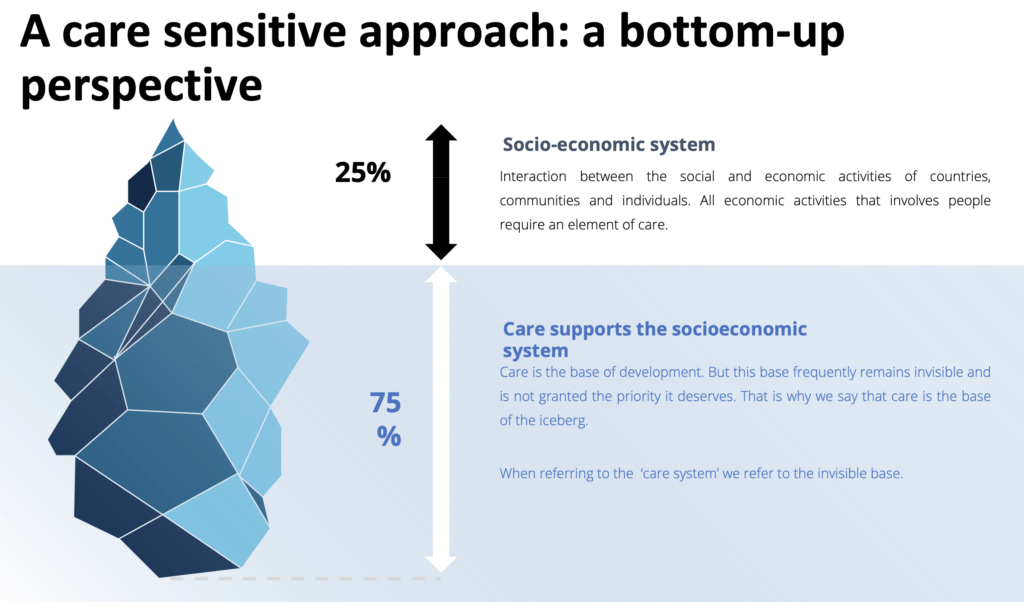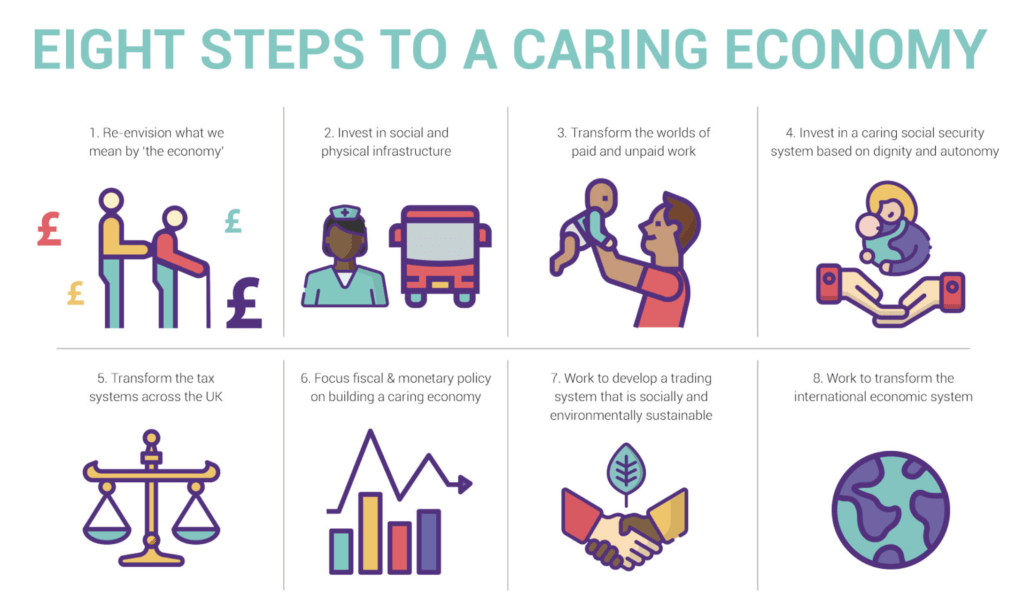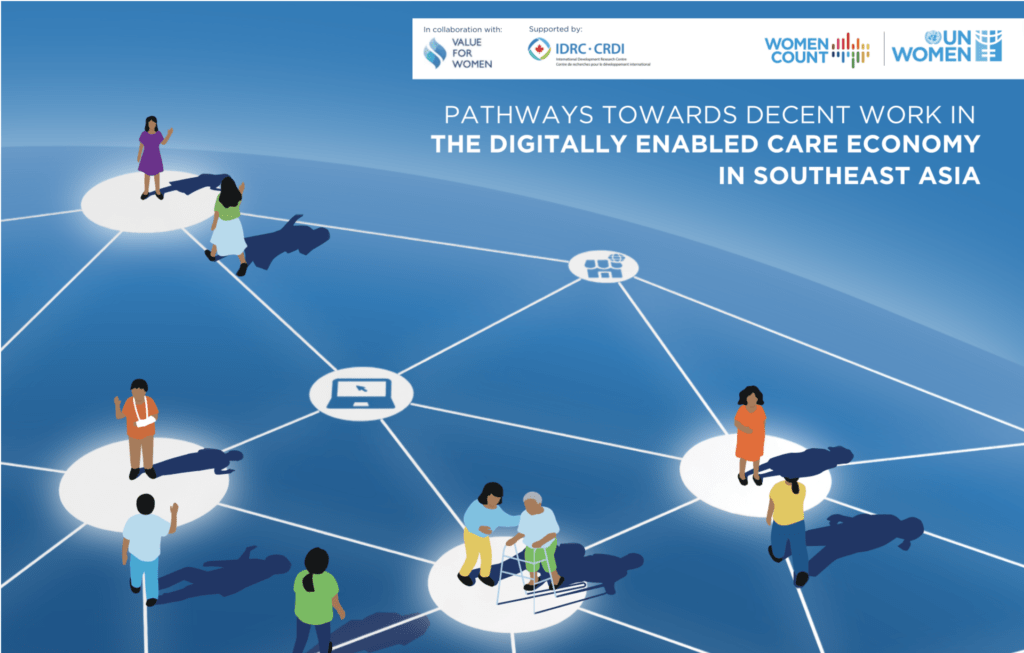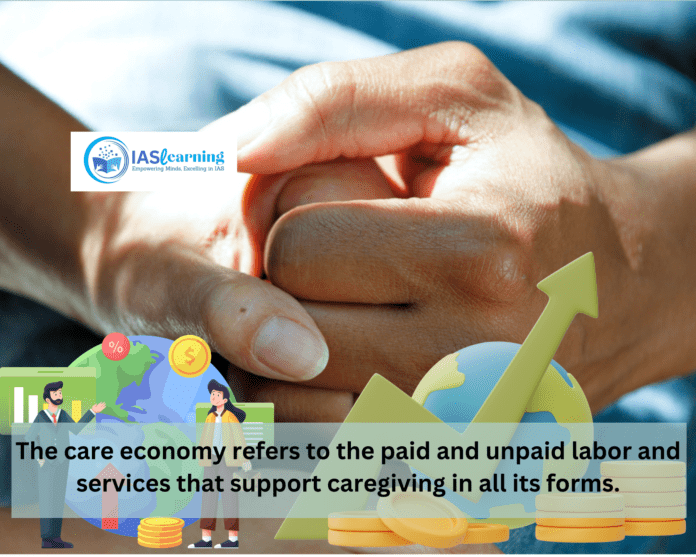Table of Contents
Introduction to Care Economy
- The importance of care work has gained widespread recognition, underscored by international commitments such as the Sustainable Development Goals (SDGs) and the International Labour Organization (ILO)’s Centenary Declaration.
- The ILO’s 2018 study, ‘Care Work and Care Jobs for the Future of Decent Work,’ initiated discussions on the Care Economy. Since March 2020, the demand for care services has surged, yet investment in this sector lags.
- The ILO’s recent report, ‘Care at Work: Investing in Care Leave and Services for a More Gender-Equal World of Work,’ emphasizes the need for focused policy support for care work and the care economy.
What is Care Economy?

- Care work, as defined by the ILO, encompasses activities and relationships that address the physical, mental, and emotional needs of individuals of all ages and abilities, from children to the elderly, both in good health and with disabilities.
- Care workers, spanning a wide spectrum from medical professionals to childcare and personal care providers, deliver crucial health, social, and educational services. This category also includes domestic workers.
- Care work encompasses both direct tasks like tending to immediate needs, such as feeding and nursing, and indirect tasks like cleaning and meal preparation.
The Significance of Care Economy :

- Societal and Economic Importance: Care work, whether paid or unpaid, is essential for the well-being of society and the functioning of the economy.
- Highlight During the Pandemic: The COVID-19 pandemic underscored the critical nature of care work, as the absence of care services created substantial challenges.
- Job Creation Potential: Doubling investment in care work from 2015 levels could generate 117 million additional job opportunities by 2030, with the relational nature of care making these professions less susceptible to automation.
- Maternal Employment: Countries that invest in both childcare infrastructure and parental leave policies see higher maternal employment rates, according to the ILO.
Reasons for Rising Demand for Care Economy :

- Demographic Shifts: Middle- and lower-income nations are experiencing demographic changes, resulting in a growing elderly population in need of extensive care.
- Urbanization: Rapid urbanization is transforming family structures, leading to smaller, nuclear, single-parent, and transnational households, often isolated from traditional community support networks.
- Female Employment: Increased female workforce participation, driven by improved education, has reduced the burden of unpaid care work on women. This shift has heightened demand for paid care services, particularly in urban areas.
India’s focus on Care Work and the Care Economy is critical for several reasons

- Employment and Growth: The care economy is a substantial source of employment, particularly for women. As India’s population ages, the demand for care work, including personal, household, and healthcare services, is expected to increase significantly. Investment in this sector has the potential to create millions of jobs, contributing to economic growth.
- Foreign Remittances: India has a significant diaspora of care workers who seek employment in other countries. Focusing on the care economy can help retain and potentially boost foreign remittances, which are essential for the country’s economy.
- Gender-Inclusive Growth: Women and girls constitute a significant portion of paid care workers worldwide and bear the brunt of unpaid care work. Prioritizing the care economy can improve female workforce participation rates and promote gender-inclusive economic growth. Recognizing the economic contribution of various care workers can also impact GDP calculations positively.
- Sustainable Development Goals (SDGs): Focusing on the care economy aligns with SDG 8, which aims to promote sustainable economic growth, full employment, and decent work for all. Investing in this sector can contribute to achieving this goal.

Steps Taken by the Government
- Maternity Act, 2017: The Maternity Benefit (Amendment) Act, 2017, provides 26 weeks of maternity leave, surpassing the ILO’s standard mandate of 14 weeks. It also mandates the provision of creche facilities by employers within a prescribed distance, supporting working mothers.
- Workplace Sexual Harassment Act: The Sexual Harassment of Women at Workplace (Prevention, Prohibition and Redressal) Act has been extended to include domestic workers, ensuring their protection and recourse against workplace harassment.
- Minimum Wage Legislation: Minimum wage legislations have been applied to domestic workers, further safeguarding their rights and economic well-being.
Addressing the issues surrounding Care Work in India requires a multifaceted approach and specific steps to support the Care Economy
- Identification Mechanism for Care Workers:Create a formal identification mechanism for care workers, distinguishing between paid and unpaid care workers, to develop targeted policies and support systems.
- Job Cards for Care Workers: Allocate job cards to formally identified care workers, enabling access to benefits and establishing an official network. This network can facilitate matching caregivers with care seekers, improve working conditions, and enhance accountability.
- Increased Government Spending: Enhance government investment in the care economy to create an enabling environment for both paid and unpaid caregivers. This includes funding for care infrastructure, services, and social benefits.
- Comprehensive Strategy and Action Plan:Develop a comprehensive strategy and action plan in consultation with relevant stakeholders to improve care policies, enhance care service provisions, and ensure decent working conditions for care workers.
- 5R Framework for Decent Care Work: Implement the ILO’s 5R framework for decent care work, emphasizing gender equality:

- Recognition: Acknowledge and value the importance of care work.
- Reduction: Reduce the burden of unpaid care work.
- Redistribution: Promote equitable distribution of caregiving responsibilities.
- Rewarding Care Workers: Ensure fair compensation and better working conditions for care workers.
- Representation: Enable the representation of care workers in social dialogue and collective bargaining.
- Paternity Leave: Consider introducing paternity leave policies to promote work-life balance for both mothers and fathers, encouraging shared caregiving responsibilities.
- Clear Implementation Guidelines: Address implementation issues in government initiatives by providing clear guidelines, introducing penalty provisions for non-compliance, and establishing monitoring mechanisms.
- Promotion of Awareness: Raise awareness among employers and the general public about the importance of caregiving and the value of care workers, emphasizing their vital role in society.
- International Collaboration: Collaborate with international organizations and countries to share best practices, research, and policies related to the care economy, learning from successful models implemented elsewhere.

Way Forward
- Recognition and Valuation of Care Work:
- Recognize and value care work as essential to the well-being of society and the economy. This includes both paid and unpaid care work.
- Raise awareness about the significance of care work among policymakers, employers, and the general public.
- Legal and Policy Frameworks:
- Develop and implement clear legal and policy frameworks that protect the rights and well-being of care workers, including provisions for fair wages, working conditions, and benefits.
- Ensure that labor laws and social protection mechanisms cover all categories of care workers, including domestic workers and informal caregivers.
- Investment in Care Infrastructure:
- Increase government spending on care infrastructure, including healthcare facilities, childcare centers, and eldercare services.
- Prioritize investment in education and training for care workers to enhance their skills and qualifications.
- Support for Unpaid Care Work:
- Implement measures to reduce the burden of unpaid care work on individuals, particularly women, through policies such as parental leave, flexible work arrangements, and accessible childcare services.
- Promote a more equitable distribution of caregiving responsibilities within households.
- Gender Equality and Inclusion:
- Ensure that gender equality is a central focus of care economy policies. This includes addressing gender-based discrimination, improving women’s access to care jobs, and supporting their career advancement.
- Promote inclusivity by recognizing the contributions of diverse care workers, including migrants and individuals with disabilities.
- Data Collection and Research:
- Collect data and conduct research to better understand the dynamics of the care economy, including the needs and challenges faced by care workers and care recipients.
- Use data-driven insights to inform policy decisions and resource allocation.
- International Collaboration:
- Collaborate with international organizations and other countries to share best practices and learn from successful care economy models implemented elsewhere.
- Advocate for global standards that protect the rights of care workers and promote ethical practices in the care sector.
- Public-Private Partnerships:
- Encourage public-private partnerships to expand access to quality care services and improve the conditions of care workers.
- Engage employers in promoting family-friendly policies that support their employees in balancing work and caregiving responsibilities.
- Advocacy and Awareness:
- Support advocacy efforts by civil society organizations and care worker associations to raise awareness about the rights and needs of care workers.
- Foster a culture that values and respects care work as a critical component of society.
- Continuous Monitoring and Evaluation:
- Establish mechanisms for continuous monitoring and evaluation of care economy policies and initiatives to assess their impact and make necessary adjustments.
FAQs
- What is the care economy?
- The care economy refers to the sector of the economy that encompasses all paid and unpaid work related to caregiving, nurturing, and meeting the physical, emotional, and social needs of individuals. This includes roles in healthcare, education, childcare, eldercare, and more.
- Why is the care economy important?
- The care economy plays a vital role in sustaining human well-being, fostering social cohesion, and driving economic growth. It encompasses essential services that support individuals and families while creating jobs and contributing to overall societal development.
- What are some key components of the care economy?
- Key components include healthcare services, childcare, education, eldercare, disability support, and social work. It encompasses both formal, paid employment in these sectors and informal, unpaid caregiving within families and communities.
- How does the care economy affect gender equality?
- The care economy often places a disproportionate burden on women, both in terms of unpaid caregiving responsibilities and lower-paying jobs in care-related professions. Addressing gender inequalities within the care economy is crucial for achieving gender equality.
- What challenges does the care economy face?
- Challenges include underinvestment, lack of recognition for unpaid caregiving, workforce shortages, inadequate compensation, and the need for improved working conditions. Balancing the economic aspects with the social and emotional dimensions of care is also a challenge.
- How can the care economy be strengthened?
- Strengthening the care economy involves investing in care infrastructure, improving job quality and wages for care workers, implementing supportive policies (e.g., paid family leave), and redistributing caregiving responsibilities more equitably within households.
- What role does the care economy play in economic growth?
- The care economy contributes to economic growth by creating jobs, enhancing human capital, and allowing other sectors to function effectively. Investments in the care economy can yield significant returns, both in terms of economic and social benefits.
- How does the care economy relate to sustainable development?
- The care economy is integral to sustainable development as it supports social well-being, reduces inequalities, and contributes to achieving several Sustainable Development Goals (SDGs), including those related to health, gender equality, and decent work.
- What are some innovative models in the care economy?
- Innovations include technology-enabled caregiving solutions, community-based care models, and initiatives to recognize and value unpaid caregiving work. These innovations aim to enhance efficiency and improve the quality of care.
- How can individuals and communities contribute to a stronger care economy?
- Individuals can contribute by participating in caregiving responsibilities, advocating for supportive policies, and promoting awareness of the importance of care work. Communities can foster networks of support and create local care solutions.

